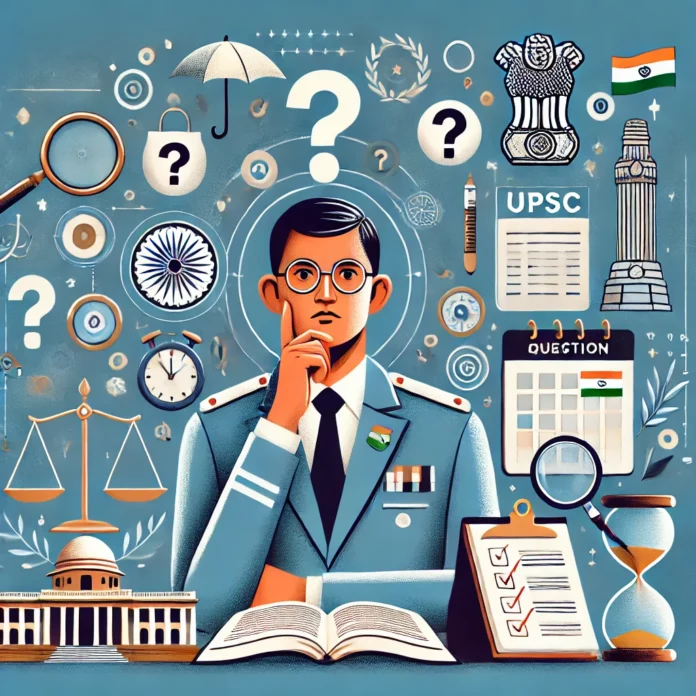The UPSC (Union Public Service Commission) Civil Services Examination (CSE) is one of the most prestigious and challenging exams in India. Over the years, aspirants have raised many common questions about the exam, its structure, preparation, eligibility, and more. Below are some of the most frequently asked questions about the UPSC exam:
1. What is the UPSC Civil Services Examination?
- The UPSC CSE is a national-level exam conducted to recruit candidates for various prestigious civil services positions in India, such as the Indian Administrative Service (IAS), Indian Police Service (IPS), Indian Foreign Service (IFS), and other central government services.
2. What are the stages of the UPSC CSE?
The UPSC exam is divided into three stages:
- Preliminary Exam (Objective type)
- Main Exam (Descriptive type)
- Interview/Personality Test
3. What is the syllabus for the UPSC Civil Services Exam?
- The syllabus for the UPSC CSE is vast and is divided into three parts:
- Prelims: General Studies (GS) Paper 1, CSAT (Civil Services Aptitude Test).
- Mains: Nine papers in total (including GS papers, optional subject papers, essay, and language papers).
- Interview: Based on personality assessment.
The detailed syllabus is available on the official UPSC website, but it broadly covers subjects like:
- History
- Geography
- Polity
- Economy
- Science and Technology
- Environment and Ecology
- Ethics, Integrity, and Aptitude
4. What is the eligibility for the UPSC exam?
- Nationality: Must be an Indian citizen (for IAS, IPS, and IFS). For other services, citizens of Nepal, Bhutan, or individuals of Indian origin may also be eligible.
- Age Limit: Generally between 21 and 32 years, with age relaxations for reserved categories (SC/ST, OBC, etc.).
- Educational Qualification: A Bachelor’s degree from a recognized university. Final-year students are also eligible to apply.
- Number of Attempts: General category – 6 attempts; OBC – 9 attempts; SC/ST – unlimited attempts until the age limit is reached.
5. How can I apply for the UPSC CSE?
- Candidates can apply online through the UPSC official website upsc.gov.in. The application process is conducted in two stages:
- Part I: Registration with basic details.
- Part II: Filling the detailed application form and fee payment.
The application forms are available after the official notification, typically in February for the Prelims.
6. What is the exam pattern for the UPSC Prelims?
- Paper 1 (General Studies): 200 marks (Objective type, 100 questions)
- Paper 2 (CSAT – Civil Services Aptitude Test): 200 marks (Objective type, 80 questions) – The CSAT paper is qualifying in nature (33% required to pass).
- Duration: 2 hours for each paper.
7. What is the exam pattern for the UPSC Mains?
- The Mains exam consists of 9 papers, including:
- Paper A: Indian Language (300 marks)
- Paper B: English (300 marks)
- Paper I: Essay (250 marks)
- Paper II-V: General Studies (250 marks each)
- Paper VI-VII: Optional Subject (250 marks each)
- The Mains exam is descriptive in nature and lasts for 5-7 days, depending on the number of candidates.
8. What are the important books and resources for UPSC preparation?
- NCERTs (Class 6-12) for foundational knowledge in subjects like History, Geography, Polity, and Economy.
- M. Laxmikanth for Polity.
- S. R. Maheshwari for Governance and Political Science (optional subject).
- GC Leong for Geography.
- Certificate Physical and Human Geography by Goh Cheng Leong.
- Lakshmikant for Polity and Constitution.
- Economic Survey & Budget for current economic affairs.
- India Yearbook by the Government of India.
- The Hindu or The Indian Express for current affairs.
9. What is the importance of current affairs in the UPSC exam?
- Current affairs play a significant role, especially in the Prelims and Mains General Studies papers. A thorough understanding of national and international events, government policies, and socio-economic issues is essential. It is recommended to follow a reliable newspaper daily, along with monthly current affairs magazines and online resources.
10. How should I choose my optional subject?
- Choosing an optional subject is a critical decision. It should be based on factors like:
- Interest in the subject
- Availability of resources and materials
- Overlap with the General Studies syllabus
- Scoring potential in the subject
- Common optional subjects include Geography, Sociology, Political Science, Anthropology, and Public Administration.
11. How much time does it take to prepare for UPSC?
- The preparation time varies depending on the individual’s background, grasp of the syllabus, and consistency. On average, candidates spend 1-2 years preparing for the UPSC exam.
- It is important to have a structured study plan and stick to it. Some aspirants start their preparation while in college, while others begin after graduation.
12. What is the UPSC interview (Personality Test)?
- The UPSC Personality Test is the final stage after the Mains exam. It assesses the candidate’s personality, communication skills, and overall suitability for a career in the civil services.
- It is not a test of knowledge but of how a candidate responds to various situations, current issues, and their general outlook on life.
13. Is coaching necessary for UPSC preparation?
- Coaching is not mandatory for UPSC preparation. Many candidates successfully clear the exam without formal coaching by using self-study materials and online resources.
- However, coaching can provide structured guidance, expert advice, and a competitive environment, which may be beneficial for some aspirants.
14. What are the UPSC cut-off marks?
- The cut-off marks for UPSC CSE are released after the examination results. These vary each year depending on factors like the difficulty of the exam, number of candidates, and available vacancies.
- The cut-off for Prelims and Mains is available on the official UPSC website.
15. What should I do if I fail in the UPSC exam?
- Failing in the UPSC exam is not uncommon. It’s important to analyze where you went wrong, learn from your mistakes, and come back stronger.
- Many successful candidates have failed multiple times before finally clearing the exam.
- Focus on improving your weak areas, refine your strategy, and keep a positive mindset.
16. What are the UPSC exam centers?
- UPSC has multiple exam centers across India, where both the Prelims and Mains exams are conducted. Candidates can select their preferred exam center during the application process.
17. How can I improve my writing skills for UPSC Mains?
- Practice writing answers regularly, focusing on clarity, conciseness, and structure.
- Use diagrams, charts, and bullet points where applicable.
- Time yourself while practicing to improve answer writing speed and accuracy.
- Review and analyze model answers to improve content quality and presentation.
18. Can I appear for the UPSC exam while working?
- Yes, many aspirants prepare for UPSC while working. However, managing work and study requires strong time management skills and discipline.
- Online courses and flexible study hours can help working professionals.
These are some of the most frequently asked questions related to the UPSC exam. Each aspect of the examination requires careful planning and dedication, so it’s important to gather as much information as possible to streamline your preparation and strategy.



